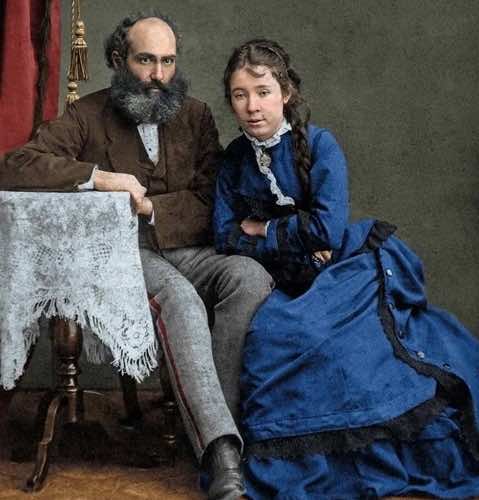Hanifa Malikova-Zardabi - one of the first women educators of Azerbaijan
Hanifa Malikova-Zardabi was born on 5 May 1856 in the North Caucasus, in the city of Nalchik. She studied in Saint Nino girls’ School in Tbilisi, Georgia, the only place available for girls’ education at that time.
Hanifa khanum married Hasan bey Zardabi, one of the founders of the enlightenment movement in Azerbaijan. The story of how couple met is very interesting. Once in the newspaper “Caucasus” he saw the list of girls graduated from the St. Nino Educational Institution in Tbilisi, in 1872. There was only one Muslim surname there – Hanifa Abayeva. Hasan bey Zardabi immediately went to Tbilisi wishing to marry this educated girl. The similarity of interests and life goals, as well as the aspiration towards enlightenment united them once and for all. Therefore they both decided to get married and work together. The young people who decided to marry received the blessing of the marriage from the patroness of the Saint Nino girls’ School, Princess Olga Feodorovna.
By marrying Hanifa khanum, Hasan bey was inspired by the presence of an understanding and supportive person in his life even more. He took more successful, confident steps towards enlightenment. He organized the first theatrical performance in the Turkic language in Baku, in 1873, together with his students. He staged the play “Haji Gara” by Mirza Fatali Akhundzadeh. On July 22, 1875, he published the first newspaper in the Turkic language in Azerbaijan “Ekinchi”.
In 1875-1877, Hanifa khanum, together with Hasan bey, was directly involved in the publication of the “Ekinchi” newspaper.
Hasan bey, who was persecuted after the publication of “Ekinchi”, gave up teaching and moved with his family to Zardab.
Since 1880, the couple lived in Zardab. Together with Hanifa khanum, he opened a free school in their home. Despite persecution and pressure, they taught children to read and write for free. In addition to teaching children, Hanifa khanum travelled from village to village and taught women sewing, writing and reading, translated and told Russian fairy tales, went from house to house to vaccinate children, organised women’s clinics in some villages.
Hanifa khanum and Hasan bey, after 16 years of living under police surveillance in the village of Zardab, returned to Baku with their family.
Hasan bey Zardabi had long dreamed of opening a school for Muslim girls in Baku. This initiative was realised thanks to Haji Zeynalabdin Taghiyev. The director of the school was to be an educated Turk. In 1901-1905 Hanifa khanum was head of the first Muslim girls’ school in Baku, and from 1909 to 1919 she was head of the first state Russian-Tartar, i.e. Russian-Azerbaijani school for girls.
After Hasan bey’s death, Hanifa khanum continued her public activity. In 1908, on her initiative, the “First Organisation of Women of Baku” was established in Baku as a branch of the “Nijat” society. The organisation, headed by Liza Tuganova, wife of Baku millionaire Murtuza Mukhtarov, soon grew into the Baku Charitable Society of Muslim Women.
From 1920 to 1926 she worked in senior positions in the Commissariat of Public Education of Azerbaijan.
In 1925, Hanifa khanum published her memoirs dedicated to Hasan bey.
Hanifa khanum Malikova-Zardabi died in Baku in 1929. She was first buried in the city cemetery. But later her remains were reburied in the Alley of Honour next to the grave of her husband Hasan bey Zardabi.
Recommended literature:
- Abbasova, Sevinc Zakir qızı. Nəsillərə örnək: Azərbaycan qadını : qədim dövr - orta əsrlər - XIX əsr / S. Z. Abbasova ; elmi red. F. F. Əhmədova ; red. V. Məmmədov. - Bakı : Elm və təhsil, 2014. - 160 s.
- Həsən bəy Zərdabi və "Əkinçi" : bioqrafik məqalələr, məktublar, xatirələr, tədqiqatlar / Azərbaycanda Vətəndaş Cəmiyyətinin İnkişafına Yardım Assosiasiyası, Söz Azadlığını Müdafiə Fondu ; red. heyəti: M. Yaqub [et al.]. - Bakı : [n. y.], 2010. - 225 s.
- Həsən bəy Zərdabi xatirələrdə : bioqrafik qaynaqlar / tərt. T. Aydınoğlu ; red. M. Çəmənli. - Bakı : Aspoliqraf, 2013. - 224 s.